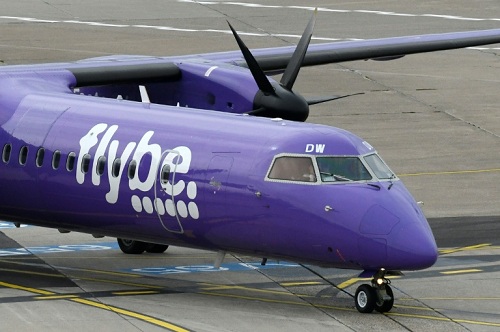This post has already been read 1900 times!
British regional airline Flybe crashed into bankruptcy Thursday after the deadly coronavirus proved to be the final nail in its coffin.
The biggest operator of UK domestic flights said it has sunk into administration — a last-ditch process aimed at salvaging at least some of the company.
And with the carrier long blighted by fierce competition, volatile fuels costs and a weak pound linked to the uncertainty over Brexit, Flybe’s announcement to ground all flights now places some 2,000 jobs at risk.
An airline source told Britain’s domestic Press Association news agency that sliding demand owing to COVID-19 had “made a difficult situation worse”.
A slew of airlines — including British Airways and Ryanair — announced Monday the cancellation of several hundred flight, in particular to Italy, as the novel coronavirus spreads throughout the globe.
Flybe narrowly avoided going bust in January when the UK government agreed to review air passenger duty paid by its customers — and shareholders pledged extra investment.
But in the early hours of Thursday, the carrier appointed administrators after the government reportedly refused a rescue loan for £100 million ($128 million, 115 million euros)
“Flybe entered administration on 5 March,” the carrier said in a brief statement.
“All flights have been grounded and the UK business has ceased trading with immediate effect.”
The Exeter-based carrier failed to turn around its fortunes since it was purchased just over a year ago by a consortium led by Virgin.
“Flybe’s financial difficulties were long-standing and well documented and pre-date the outbreak of COVID-19,” said a government statement.
Flybe, which flies about eight million passengers annually, is owned also by investment firm Cyrus and infrastructure specialist Stobart.
– ‘Long-standing difficulties’ –
Flybe operates from 43 airports across Europe and 28 in Britain, and its collapse left potentially thousands of people stranded far from home.
 AFP /Flybe
AFP /Flybe
The British government said it had asked bus and train operators to accept Flybe tickets and other airlines to offer reductions to help passengers reach their destination.
Flybe’s owner, the Connect Airways consortium, said “every possible attempt” had been made to avoid the collapse, but that the airline had been “unable to overcome significant funding challenges”.
At the start of the year, Flybe agreed a payment plan with authorities to defer tax payments of less than £10 million.
That announcement came just days after the airline was saved from collapse in a last-minute financial rescue, with Prime Minister Boris Johnson’s Conservative government agreeing to review air passenger duty (APD) paid by Flybe’s customers.
Following the tax deferral, rival companies, including British Airways-parent IAG, complained to the European Union that it was receiving unfair state aid.
The government said its assistance did not breach EU rules and that help was based on the importance of the company’s domestic services.
– Timely warning –
Flybe’s demise follows a timely coronavirus warning from Dublin-based low-cost airline Ryanair at the start of this week.
The Irish carrier forecast that the fatal outbreak — which has killed 3,200 and infected 95,000 worldwide so far — would spark more European airline failures.
 AFP/File / PETER MUHLYFlybe operates from 43 airports across Europe and 28 in Britain, and its collapse left potentially thousands of people stranded far from home
AFP/File / PETER MUHLYFlybe operates from 43 airports across Europe and 28 in Britain, and its collapse left potentially thousands of people stranded far from home
“We expect that this COVID-19 virus will result in further EU airline failures over the coming weeks,” Ryanair said Monday.
Recent high-profile casualties in Europe’s battered aviation sector include French carriers Aigle Azur and XL Airways, as well as Slovenia’s Adria Airways and Britain’s Thomas Cook, which was both a tour operator and an airline.
In contrast to Flybe, Thomas Cook collapsed without any government assistance in September, causing the loss of 22,000 jobs worldwide and stranding 600,000 holidaymakers abroad.



